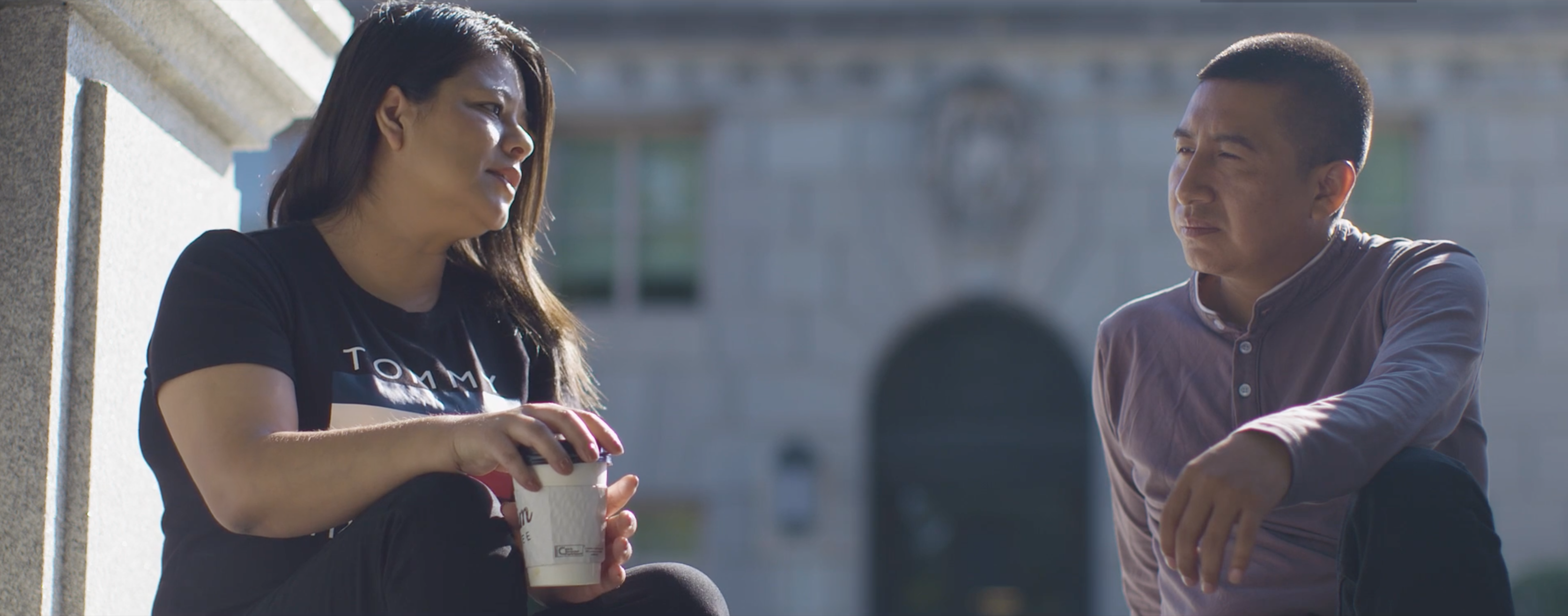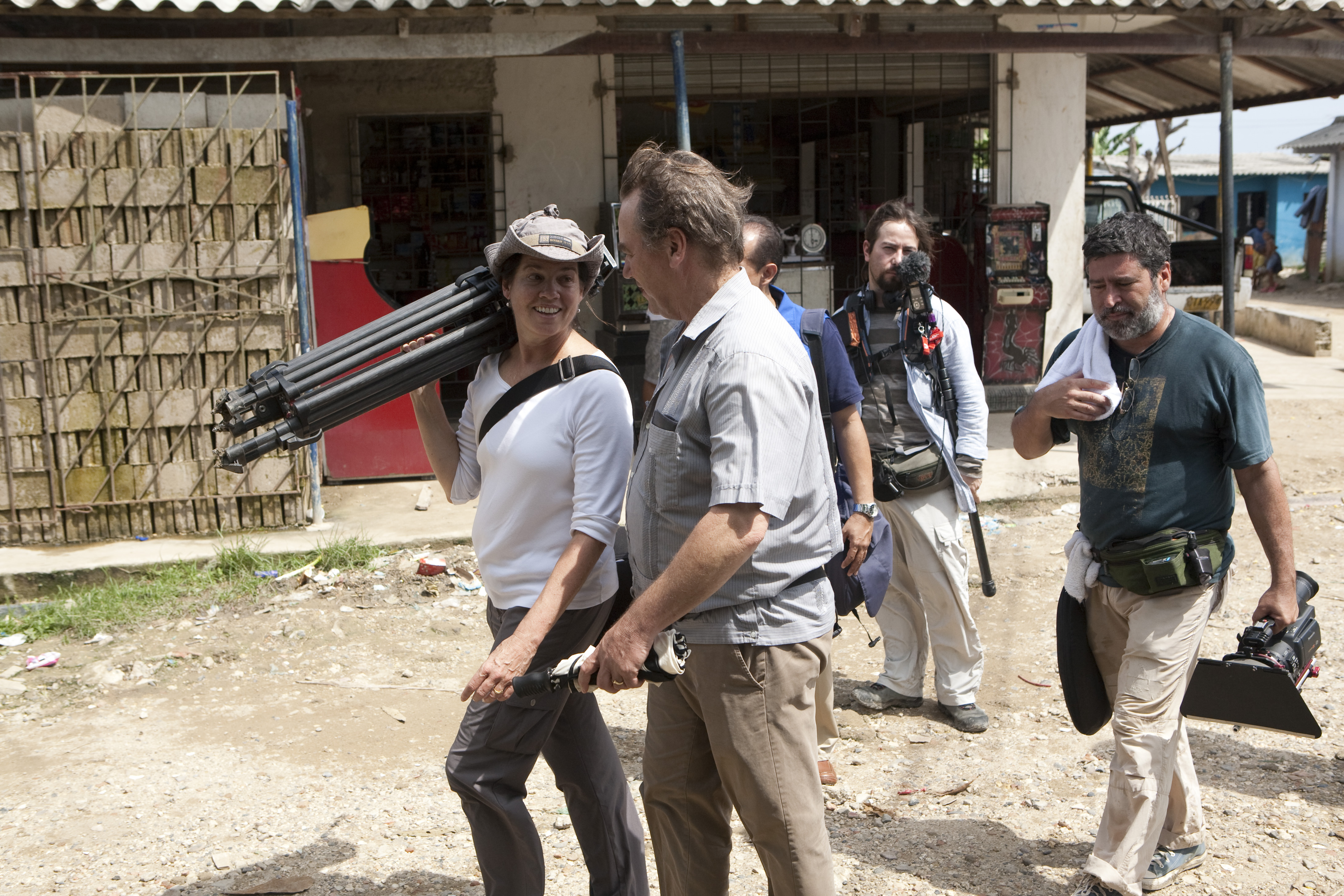Welcome to Amplify, where we feature interviews with immigrant justice field leaders to showcase their work and provide a platform for their perspectives.
In this edition, GCIR President Marissa Tirona hosts our very first Amplify podcast episode! She speaks with Paco de Onís and Pamela Yates, who co-founded Skylight Pictures, a nonprofit human rights media organization. Paco serves as the organization’s executive director, and Pamela is Skylight’s creative director.
Paco de Onís and Pamela Yates
Together, they created the new documentary Borderland: The Line Within. The film follows the stories of Gabriela Castañeda and Kaxh Mur'al, two people who were driven from their home countries to seek security in the United States – and whose paths eventually intersect. By following their stories, the invasiveness of and exorbitant investment in the southern U.S. border is laid bare.
In this interview, Paco and Pamela share the story of how Skylight came to be, what building narrative power means, why narrative work should be prioritized in philanthropic funding, and more.
You can listen to the full interview by pressing the orange play button below. Interview highlights and clips are also featured below. If you would like to learn more about Borderland: The Line Within, how to support the film’s impact campaign, or how you can host a screening for your organization, visit the film’s website. You can also join upcoming screening events:
-
Sag Harbor Cinema, Sag Harbor, NY, June 9, 2024 | A conversation will be hosted following the screening and will be moderated by Wendy Keys. Tickets will be available soon.
-
DCTV Firehouse Cinema, NYC, September 13-19, 2024 | Q&As with the Skylight team and protagonists will follow each screening. Tickets will be available later this summer.
-
Arthouse cinema tour, multiple cities across the U.S., September and October | The Skylight team will be in person at each stop, with protagonists joining for conversations at each cinema. Details to be announced.
-
Virtual private screenings will also be conducted for outreach and impact partners. If you’re part of a national, statewide, or local organization fighting for immigrant rights or working to counter the toxic narrative around immigration, please contact Skylight.
interview highlights
On how they define narrative power, their strategies for building it, and what they hope to achieve with it:
Paco: “Narrative power is at the heart of what we do. We feel that narrative power lies in its ability to change the story, to shift narratives that are out there – very often toxic narratives. Let’s take the case of immigration which is what Borderland focuses on. We feel like a war is being waged on immigrants, and why? What is it about that story that needs to be permanent? We feel that another story needs to emerge, which is the humanity, first of all, of the immigrants.
Narrative power is when you can actually shift those narratives, and the power lies in the humanity of the protagonists in those stories.”
Pamela: “Narrative power is often a counter-narrative. We’re telling a counter narrative to what we’re being mediated to, day in and day out.
We also know that narrative power can be about giving the microphone, giving the voice to people that we so rarely hear about. Maybe they’re people that don’t speak English yet, maybe they’re people that have just arrived, maybe they’re people that are very smart but not educated. Those are the people that actually have a vibrant voice, and those are the people who are the protagonists in the films that we make.”
Gabriela Castañeda and Kaxh Mur'al, two protagonists in Borderland: The Line Within
On how philanthropy can prioritize their investments in building narrative power for immigrant communities:
Paco: “We’re a nonprofit human rights media organization. The way we practice human rights is through narrative, narrative power through our films. We also have a laboratory called SolidariLabs that brings together filmmakers and other artists who work in narratives with activists around a certain theme.
What it takes is building a team. So if you want to get these stories out there and embed them in the media ecosystem of a society, it really takes a team of people working the film but also other shorter versions that go on social media, organizing the screenings, and always there should be a space to discuss the ideas that people just saw in the film.
So, all of that, at least in the work that we do, philanthropy can really help by just supporting the expenses and logistics of putting a team out there to try to shift the narratives.”
Pamela: “We like to create a virtuous cycle. And the virtuous cycle consists of the narrative, telling the story, telling a story that will have emotional impact on people in a way that when they finish watching the film, they really want to know more. They really want to do more. A switch has been flipped. We want to be able to provide a place for them to go, and ways for them to learn more.
The virtuous cycle consists of, in Solidarilabs, having community leaders, having immigrants, having movement leaders understand the power of narrative, understand the power of documentary film making so that they can understand how to work with documentary film makers and use the films to strengthen their work, and maybe even use the films to help fundraise for their work. And we make our films available for people to do that.”
Paco and Pamela filming with the Skylight team.
On their vision for the next 5-7 years and how narrative power-building will help realize that vision:
Paco: “At the core of our vision is to get to a society that is not so divisive. People are afraid to talk to each other about things. Immigration has become this fraught issue when it should be welcomed as part of our heritage.
I would love to see policies that aren’t criminalizing people who are not criminals at all. In fact, they are our friends.
An important point we haven’t touched on is labor rights. Undocumented immigrants are doing all of this work that we depend on – restaurants, the construction industry, you name it – and they don’t have labor rights. They can’t unionize, they can’t look out for themselves because they don’t have the legal status. And that’s another thing that really needs to change so that they can live with dignity and not be living hand-to-mouth.”
Pamela: “My vision is that we see many more counter-narratives to what the mainstream media is putting out there, and that many of those narratives are told by immigrants themselves. They have the best way of describing their experiences and what it is they need, and I really feel like we should listen to them.
Transformative change – that’s a big one – but I feel like we need to be on the right side of history, and the right side of history is not spending $25 billion of taxpayer money to punish people. Being on the right side of history is spending $25 billion to welcome people, and to resettle people, and to help make their lives here much, much better. I think that is an idea that not only benefits immigrants, but it benefits all of us. We will not be living in this chaos, and we will not be living in fear of the other. The fear of the other is what ushers in authoritarianism or ushers in fascism. There’s no reason to have fear of the other.”
The Skylight team filming the sunset in the Sonora Desert.


